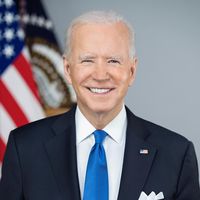The Tenuous Path to Peace: Negotiations in the Gaza Conflict
January 13, 2025, 9:38 am
Donald J. Trump
Verified account
Location: United States, Virginia, Arlington
Employees: 201-500
Founded date: 2015

Location: United States, District of Columbia, Washington
Employees: 1001-5000
Total raised: $500K

Location: United States, District of Columbia, Washington
Employees: 10001+
Founded date: 2000
In the heart of the Middle East, a delicate dance unfolds. Israeli Prime Minister Benjamin Netanyahu has dispatched a high-level delegation to Qatar. Their mission? To negotiate the release of hostages and forge a ceasefire in Gaza. The stakes are high, and the clock is ticking.
The backdrop is grim. The war in Gaza has left a trail of devastation. Since Hamas's attack on October 7, 2023, over 1,200 Israelis have lost their lives. The toll on the Palestinian side is staggering, with reports indicating more than 46,000 deaths, many of whom are civilians. The humanitarian crisis deepens with each passing day.
Netanyahu's decision to send senior officials to Doha signals a shift. It reflects a growing urgency to resolve the conflict. The delegation includes heads of the Mossad and Shin Bet, Israel's top intelligence and security agencies. This is not just a diplomatic mission; it’s a race against time. The families of hostages are desperate for news. They cling to hope, urging their leaders to "leave no stone unturned."
In the shadows, the United States plays a pivotal role. President Joe Biden's administration has been mediating talks alongside Qatar and Egypt. The goal is clear: end the violence and secure the release of hostages. Biden has hinted at "real progress" in the negotiations, but the path remains fraught with challenges.
As the clock ticks down to Biden's departure from office on January 20, 2025, the pressure mounts. Donald Trump, the incoming president, has made his stance clear. He has warned Hamas of "hell to pay" if the hostages are not released by his inauguration. This looming deadline adds a layer of urgency to the discussions.
The dynamics of the negotiations are complex. Analysts suggest that Netanyahu may prefer to finalize a deal under Trump's administration. The shift in leadership could alter the balance of power in negotiations. The stakes are not just about hostages; they are about the future of Israeli-Palestinian relations.
In Doha, Qatari officials are working tirelessly. They brief Trump’s Middle East envoy, Steve Witkoff, on the latest developments. The discussions revolve around a ceasefire and the release of hostages. The international community watches closely, hoping for a breakthrough.
The situation on the ground is dire. Protests erupt in Tel Aviv as demonstrators demand a ceasefire and the release of hostages. The voices of the people echo through the streets, a stark reminder of the human cost of conflict. Families are torn apart, lives shattered.
The negotiations are not just about politics; they are about people. Each hostage represents a family, a story, a life interrupted. The Hostages and Missing Families Forum has called this a "historic opportunity." They urge leaders to act decisively.
Indirect negotiations between Israel and Hamas resumed recently in Qatar. The focus is on the immediate release of hostages taken during the October attack. The discussions are fraught with tension. Trust is a fragile commodity in this conflict.
As the talks progress, the world holds its breath. The stakes are high, and the consequences of failure are dire. A breakdown in negotiations could lead to further violence, deepening the humanitarian crisis.
The role of mediators is crucial. Qatar, alongside Egypt and the U.S., has positioned itself as a key player in these talks. Their influence could be the linchpin that holds the fragile peace together.
Yet, skepticism lingers. Many analysts question whether a lasting agreement can be reached. The history of Israeli-Palestinian negotiations is littered with broken promises and failed attempts.
The clock is ticking. As Biden prepares to leave office, the window for a resolution narrows. The incoming administration may bring a new approach, but the challenges will remain.
In the end, the path to peace is a winding road. It requires patience, understanding, and a willingness to compromise. The world watches, hoping for a breakthrough. The stakes are not just political; they are profoundly human.
As negotiations unfold, the hope for a ceasefire and the release of hostages hangs in the balance. The next few days could determine the course of the conflict. The stakes are high, and the world is waiting.
In this intricate web of diplomacy, every word matters. Every decision carries weight. The future of countless lives hangs in the balance. The road to peace is long, but it begins with a single step. Will leaders take that step? Only time will tell.
The backdrop is grim. The war in Gaza has left a trail of devastation. Since Hamas's attack on October 7, 2023, over 1,200 Israelis have lost their lives. The toll on the Palestinian side is staggering, with reports indicating more than 46,000 deaths, many of whom are civilians. The humanitarian crisis deepens with each passing day.
Netanyahu's decision to send senior officials to Doha signals a shift. It reflects a growing urgency to resolve the conflict. The delegation includes heads of the Mossad and Shin Bet, Israel's top intelligence and security agencies. This is not just a diplomatic mission; it’s a race against time. The families of hostages are desperate for news. They cling to hope, urging their leaders to "leave no stone unturned."
In the shadows, the United States plays a pivotal role. President Joe Biden's administration has been mediating talks alongside Qatar and Egypt. The goal is clear: end the violence and secure the release of hostages. Biden has hinted at "real progress" in the negotiations, but the path remains fraught with challenges.
As the clock ticks down to Biden's departure from office on January 20, 2025, the pressure mounts. Donald Trump, the incoming president, has made his stance clear. He has warned Hamas of "hell to pay" if the hostages are not released by his inauguration. This looming deadline adds a layer of urgency to the discussions.
The dynamics of the negotiations are complex. Analysts suggest that Netanyahu may prefer to finalize a deal under Trump's administration. The shift in leadership could alter the balance of power in negotiations. The stakes are not just about hostages; they are about the future of Israeli-Palestinian relations.
In Doha, Qatari officials are working tirelessly. They brief Trump’s Middle East envoy, Steve Witkoff, on the latest developments. The discussions revolve around a ceasefire and the release of hostages. The international community watches closely, hoping for a breakthrough.
The situation on the ground is dire. Protests erupt in Tel Aviv as demonstrators demand a ceasefire and the release of hostages. The voices of the people echo through the streets, a stark reminder of the human cost of conflict. Families are torn apart, lives shattered.
The negotiations are not just about politics; they are about people. Each hostage represents a family, a story, a life interrupted. The Hostages and Missing Families Forum has called this a "historic opportunity." They urge leaders to act decisively.
Indirect negotiations between Israel and Hamas resumed recently in Qatar. The focus is on the immediate release of hostages taken during the October attack. The discussions are fraught with tension. Trust is a fragile commodity in this conflict.
As the talks progress, the world holds its breath. The stakes are high, and the consequences of failure are dire. A breakdown in negotiations could lead to further violence, deepening the humanitarian crisis.
The role of mediators is crucial. Qatar, alongside Egypt and the U.S., has positioned itself as a key player in these talks. Their influence could be the linchpin that holds the fragile peace together.
Yet, skepticism lingers. Many analysts question whether a lasting agreement can be reached. The history of Israeli-Palestinian negotiations is littered with broken promises and failed attempts.
The clock is ticking. As Biden prepares to leave office, the window for a resolution narrows. The incoming administration may bring a new approach, but the challenges will remain.
In the end, the path to peace is a winding road. It requires patience, understanding, and a willingness to compromise. The world watches, hoping for a breakthrough. The stakes are not just political; they are profoundly human.
As negotiations unfold, the hope for a ceasefire and the release of hostages hangs in the balance. The next few days could determine the course of the conflict. The stakes are high, and the world is waiting.
In this intricate web of diplomacy, every word matters. Every decision carries weight. The future of countless lives hangs in the balance. The road to peace is long, but it begins with a single step. Will leaders take that step? Only time will tell.